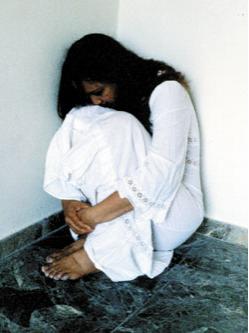
WOMEN's rights campaigners are demanding urgent changes to a draconian law that they claim encourages rape.
Under current Bahraini legislation, rapists are escaping punishment dished out by the courts by marrying their victims after they have been convicted.
Victims often agree to the marriage because of the social stigma, fearing that having been raped they will be unable to find another husband.
However, activists claim that in most cases the rapist divorces his victim soon after the marriage - having already secured his freedom.
They are now calling for changes to the law so that convicted rapists have to serve their full prison sentence, regardless of whether they marry their victims or not.
Batelco Care Centre for Family Violence Cases president Dr Banna Bu Zaboon argued the current law actually promoted violence against women.
"Because of the stigma in society they (the victims) agree to get married, but it causes more problems and leads to further sexual and physical abuse and psychologically it is very damaging," Dr Bu Zaboon told the GDN.
"In most cases they don't stay married because they (the rapists) say they never intended to marry a girl they already know."
In the latest case reported by the GDN, a convicted rapist sentenced to three years in jail was allowed to walk free after judges heard that he had married his victim - who had previously worked as his housemaid.
Bahrain Human Rights Watch Society secretary general Faisal Fulad said the loophole was simply a get out of jail free card for rapists.
"Imagine he raped her for a few weeks and beat her and when they come to the judge he says if you marry her you will be free," said Mr Fulad, who is also a Shura Council member.
Click here to read the full story:
By Rebecca Torr
Gulf Daily News
Photo credit:
Gulf Daily News
Related links:
More About Rape on AWR
More About Bahrain on AWR
2010-03-03
Posted in Women In the News

Professor Reem Asaad, an economics professor at Dar al-Hikma Women's College in Jeddah, Saudi Arabia, has called for a two-week-long boycott of lingerie stores with male employees.
She and many others believe that it is indecent and against their religion for men to know women's underwear sizes when the men and women are unrelated.
The core of all the controversy is that women are not allowed to have jobs anywhere that men do. The Wahhabi strain of Islam, practiced in Saudi Arabia, entails separation of the sexes. The fact that men are giving women their underwear sizes is therefore beyond ironic.
Further adding to the ludicrousness of the situation, women cannot even be correctly measured for their underwear sizes because the male employees are not allowed to do so.
Although Saudi Arabia's Labour Ministry passed a law stating that only women would be employed in lingerie shops, the law has not been implemented. Because of this, Professor Reem Asaad has used her Facebook page to mobilize a boycott. Since public protests are not allowed in Saudi Arabia, a boycott or petition is usually the best possible means of mobilizing widespread support for change.
The entire situation, quite frankly, is preposterous. It is the government's responsibility to support every person, regardless of gender, in their endeavors. Separation of men and women is going to have to be dismantled eventually; if not now, then very soon, and it will probably be very ugly.
And who gets the bad end of the deal here? Women, of course. No, there is no issue with women being employed in stores for men because women are not allowed to have jobs where men work. Women would have to work in women-only stores if they wanted to have a sales job. Why is there this double standard? Why are women in Saudi Arabia clearly secondary to men?
Click here to read the full story:
By Yasmin Radbod
The Retriever Weekly
Related links:
More About Lingerie on AWR
More About Saudi Arabia on AWR
2010-03-03
Posted in Women In the News
 Susan notes: this is such an inspiring story. Still, I think it's important to remember that medals aren't everything: see my blog post Still Worth Your Weight (And More) In Gold.
Susan notes: this is such an inspiring story. Still, I think it's important to remember that medals aren't everything: see my blog post Still Worth Your Weight (And More) In Gold.
Canada's bronze medal-winning figure skater Joannie Rochette said that her Vancouver success was predicted by her mother just days before her tragic death.
The world silver medallist's 55-year-old mother Therese died from a heart attack four days ago in Vancouver. And the young skater put her grief behind her to pull out a gutsy performance which gave her an Olympic bronze in a tough field led by runaway South Korean gold-medal winner Kim Yu-Na.
Rochette explained how she had been having a problem with one of her triple jumps, the lutz, and she phoned her mother.
"It was my goal coming here to be on the podium and my mom told me last week 'you're going to get it. I know it,'" said Rochette.
"I'm sure if she could have seen my triple lutz tonight, she would have been proud."
The 24-year-old admitted it was a battle to compete but she had been boosted by the thousands of messages of support she received from around the world.
"I felt so much love in so little time," she said. "All of your comments and all of your letters really helped me in one way or another get on the ice and skate here for myself, for my country and for my mother."
Taking to the ice for Tuesday's short programme was the toughest, she said.
"It was the first competition since it happened and it's the first important competition that my mom was not in the stands attending.
"Even though I was trying to be an athlete focused on my goals, emotions just took the best out of me. I was proud that I could control them.
"I really didn't feel like skating because my mind was not really here and I'm glad I did it because in 10 years and the pain is gone away a little bit, I would have wished I had skated here and that's one of the reasons why I did it and I know that's what my mom would have wanted me to do."
Click here to read the full story:
Telegraph.co.uk
Photo credit:
Telegraph.co.uk
Related links:
More About the Olympics on AWR
2010-02-27
Posted in Women In the News

Susan notes: Melanne Verveer, Ambassador-at-Large for Global Women's Issues, testified before the Subcommittee on International Operations and Organizations, Human Rights, Democracy and Global Women's Issues of the Senate Foreign Relations Committee in Washington, DC. on February 23, 2010. Here's what she said:
I am honored to appear before you today to describe why women and girls are among the most powerful – but still largely underutilized – agents for change to advance security, stability, and development in Afghanistan.
I request that my submitted written testimony be entered into the record, and I will briefly summarize from it. I’d also like to thank you, Senators, for the leadership you have shown on issues affecting Afghan women.
Our civilian assistance strategy in Afghanistan incorporates the values of human rights, good governance, and rule of law. Women’s empowerment in Afghanistan and their full and equal participation in their society are fundamental prerequisites for achieving this strategy.
The era of brutal repression by the Taliban has passed, yet on every measure of development and in every sphere, women in Afghanistan continue to suffer solely because they were born female.
In the political realm, women made immediate gains after the Taliban era. Many entered political life at the most senior levels. However, deteriorating security conditions have made their participation in public life more difficult. Their political gains today appear fragile and require urgent and sustained attention from the international community.
The legacy of the Taliban continues to limit women’s literacy levels, their ability to participate in the professional workforce, and the educational and healthcare infrastructure and resources available to them. Pervasive discrimination remains at every level of society, and Afghan women suffer high levels of domestic abuse and violence in many forms. This violence cannot be explained away as cultural or private; it is criminal and must be addressed as such.
In the face of so many deeply entrenched problems and barriers to progress, it would be tempting to see Afghan women as little more than the victims of the enormity of their circumstances, who have nothing to do with waging a successful counterinsurgency. Nothing could be further from the truth. I traveled to Afghanistan just before the 2009 presidential elections there to reaffirm our country’s commitment to Afghan women and to hear from them how they were faring.
Click here to read the full story and/or hear the video:
By Melanne Verveer
US Department of State
Photo credit:
US Department of State
Related links:
More About Afghanistan On AWR
2010-02-25
Posted in Women In the News
 WOMEN's rights campaigners are demanding urgent changes to a draconian law that they claim encourages rape.
WOMEN's rights campaigners are demanding urgent changes to a draconian law that they claim encourages rape. Professor Reem Asaad, an economics professor at Dar al-Hikma Women's College in Jeddah, Saudi Arabia, has called for a two-week-long boycott of lingerie stores with male employees.
Professor Reem Asaad, an economics professor at Dar al-Hikma Women's College in Jeddah, Saudi Arabia, has called for a two-week-long boycott of lingerie stores with male employees.
 Susan notes: this is such an inspiring story. Still, I think it's important to remember that medals aren't everything: see my blog post
Susan notes: this is such an inspiring story. Still, I think it's important to remember that medals aren't everything: see my blog post 